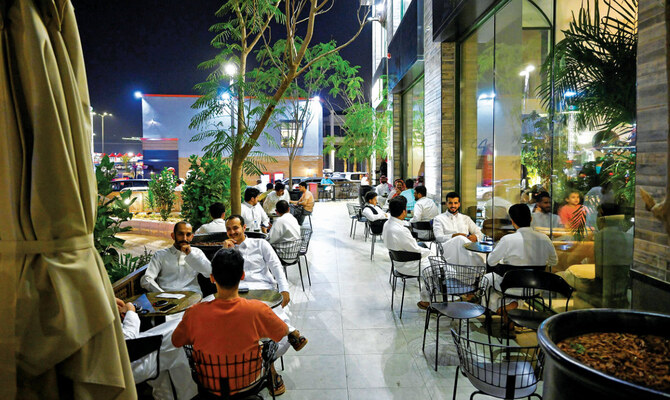RIYADH: Saudi Arabia’s tech-savvy population is pushing consumer fintech to new heights, with innovations such as buy now, pay later gaining significant traction, according to industry experts.
In an interview with Arab News, Arjun Singh, partner and global head of fintech at Arthur D. Little Middle East, described the Kingdom’s consumer finance landscape as undergoing a natural evolution, with an increasing array of financial products tailored to meet the diverse needs of its expanding market.
“There is no doubt that the market is maturing, and we are witnessing growth across multiple consumer finance segments,” he said.
Types of personal lending
Singh pointed to traditional forms of personal lending and credit cards offered by banks and other financial institutions, which continue to grow, “albeit at a slower pace than was anticipated a few years ago.”
Other segments include microfinance and microloans, targeting underserved populations such as small and medium-sized enterprises and low-income individuals. “These products seek to promote financial inclusion by extending credit access to underserved populations,” he said.
Emerging fintech solutions are also playing a significant role. Singh noted the rise of peer-to-peer lending in Saudi Arabia, which, although still in its early stages, is gaining momentum.
“P2P lending is emerging as an alternative to traditional banking credit, facilitating loans between individuals without intermediaries,” he explained. Several fintech players are currently operating within the Saudi Central Bank’s Sandbox, experimenting with new approaches to consumer finance.
Earned Wage Access is another growing segment in the Kingdom’s evolving financial ecosystem.
EWA solutions allow employees to access their earned wages before payday, offering much-needed financial relief.
“This service helps alleviate financial stress for workers, particularly during times of economic uncertainty,” Singh said, citing the recent partnership between Al Raedah Finance and Abhi as an example of this trend.
In addition to these innovations, digital wallets and mobile payments, such as stc pay and Apple Pay, are reshaping how consumers access and manage their funds.
While these solutions do not strictly fall under the consumer finance category, Singh noted that they have had a significant impact on behavior in Saudi Arabia. “They have changed the way consumers manage and access their funds,” he stated.
The power of strong regulations
According to Abdulla Al-Moayed, CEO of open banking leader Tarabut, consumer lending growth is further supported by strong regulatory backing from the Kingdom’s central bank, which has played a proactive role in introducing frameworks that encourage fintech growth while ensuring consumer protection.
As a result, Saudi Arabia now hosts a highly competitive consumer finance sector with a wide range of payment products offering transparency, flexibility, and ease of use.
“We are seeing, today, a deeper focus on building a more personalized and accessible financial ecosystem,” Al-Moayed told Arab News. “Open Banking-enabled financing solutions, digital payments, micro-financing, and buy now, pay later are all coming to the forefront as customer demand focuses on digitized interactions and more intuitive and personalized financing services,” he added.

There is no doubt that the market is maturing, and we are witnessing growth across multiple consumer finance segment.
Arjun Singh, Partner and global head of fintech at Arthur D. Little Middle East
These developments are promoting greater inclusion in the financial sector and streamlining services for consumers.
Cultural and economic factors have also played a crucial role in the appeal of consumer lending compared to other financial options in Saudi Arabia.
Powered by BNPL
BNPL has emerged as a prominent force in the Kingdom’s consumer finance landscape.
Al-Moayed explained that BNPL aligns with the cultural and religious preferences of many Saudi consumers.
“For many Saudi consumers, BNPL provides a more culturally acceptable alternative to traditional credit, as it is framed as a manageable, interest-free option rather than long-term debt accumulation,” he noted.

We are seeing, today, a deeper focus on building a more personalized and accessible financial ecosystem.
Abdulla Al-Moayed, CEO and founder of Tarabut
This structure fits more comfortably within the guidelines of Shariah-compliant finance, making it a more attractive choice for consumers who might otherwise avoid traditional credit options.
“We have been observing a surge in demand for BNPL spearheaded by the likes of Tabby and Tamara,” Singh said.
According to Singh, the Saudi BNPL market is expected to grow from $1.4 billion in 2024 to $2.8 billion by 2029, at a compound annual growth rate of over 10 percent.
Initially, BNPL targeted younger, digitally savvy consumers with flexible, interest-free alternatives to traditional credit options, particularly for discretionary purchases such as fashion and clothing.
Trust and familiarity with BNPL services are also growing in the Kingdom.
“As more local BNPL players enter the market and build partnerships with trusted brands, consumers are more willing to use BNPL services as a safe, reliable, and more accessible alternative to traditional payment options,” Al-Moayed said.
The growing youth population in Saudi Arabia — who value transparency, convenience, and speed — are especially receptive to non-traditional financial solutions that provide instant gratification without long-term financial commitments.
“BNPL offers digital-first, flexible, transparent, and accessible credit facilities,” he said. This demographic, known for being tech-savvy and financially conscious, has embraced BNPL as a key part of the ongoing transformation of Saudi Arabia’s financial services sector.
Al-Moayed emphasized that future iterations of BNPL will likely be shaped by how the model leverages open banking, enabling it to democratize financial services further, enrich data for business growth, and empower consumers to take more control of their financial futures.
Singh explained that BNPL’s user base is now expanding as the service evolves and is nowbeing offered in multiple variants across a range of sectors.
The model has even expanded into the business-to-business space, offering companies access to short-term, interest-free installment options without the stringent credit scrutiny that often accompanies traditional loans.
“It solved the problem of liquidity which both consumers and businesses face from time to time,” Singh remarked.
Al-Moayed also pointed to the ongoing digital transformation driven by the Saudi government’s Vision 2030 initiative, which is accelerating the shift to a digital-first economy across all sectors, including retail and finance.
“The Saudi e-commerce market has been expanding rapidly,” he said, with BNPL’s integration into mobile apps and e-commerce platforms further widening its appeal.
“BNPL’s integration seamlessly taps into an even wider consumer base, expanding its appeal across the board,” Al-Moayed concluded.





























